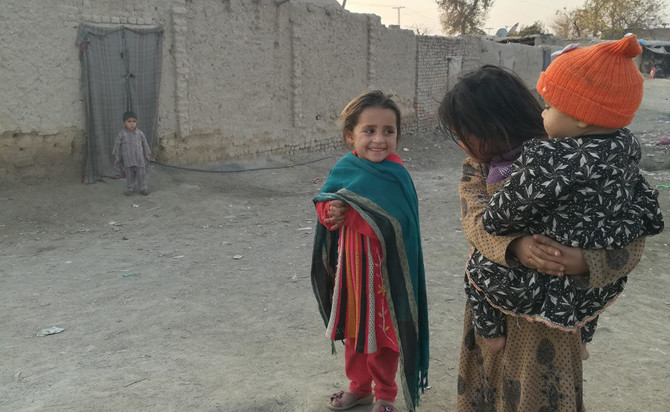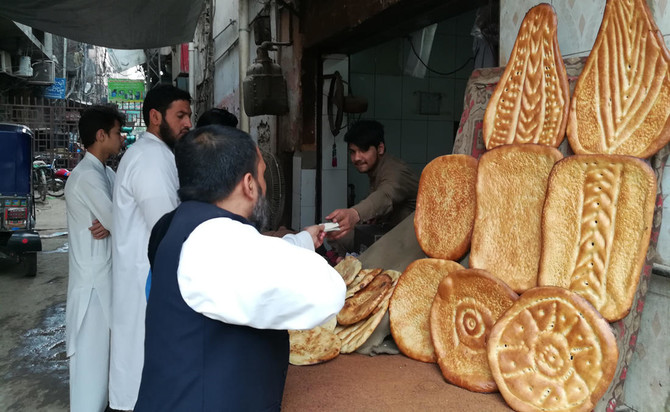PESHAWAR: Afghan refugees have hailed the Pakistan government’s decision to extend their stay until June, as most of them say it is difficult to make a living in Afghanistan.
Bahaud Din, an Afghan refugee and manager of Baba Wali Afghan Restaurant in Peshawar, told Arab News that he had visited his native Kunduz area of Afghanistan a year ago.
“Kunduz is lawless and militants are in large numbers there. We are perturbed by security situation and there is no employment. Even if we become jobless in Pakistan, at least our lives are safe here,” he said.
He said Afghans are not a burden on Pakistan where they work hard to earn a living and also provide employment for Pakistanis. “I have given jobs to eight Pakistanis at my hotel here.”
Abdul Hameed and Muhammad Azam, two brothers from the Panjsher area of Afghanistan, run a shop in the famous gemstone market in Peshawar. “We cannot leave Pakistan. We have been running a good business in gemstones here for the past 36 years.”
Faheem Khan, who bakes Afghan naan bread in Peshawar’s Shuba Bazaar, said that they have run their Peshawar business for the last 60 years.
“Baking Afghan naan is the profession of our grandfather, who moved from Afghanistan to Peshawar,” said 40-year old Khan.
He welcomed the extension but added that the Afghans born in Pakistan should be given Pakistani nationality as is the rule in most of the countries around the world.
“I don’t know where I will live in Afghanistan if I am taken there because I have not even visited since my birth in Pakistan,” said Khan.
Afghanistan’s Deputy Ambassador Zardasht Shams told Arab News that repatriating refugees are given $200 (SR750) each and the government is also working on a package to facilitate allotment of land to Afghans.
He said: “All repatriating Afghans are not entitled to get lands in Afghanistan because many already own lands and have relatives there, but the Afghan government is working to provide land to those who don’t have any shelter there.”
He added that as Afghanistan is a war-ravaged country, it is not possible to provide jobs to all returning Afghans.
“We appeal to the affluent Afghans, who have invested in Pakistan, to shift to Afghanistan so that they also start businesses and generate employment for other Afghans there.”
On 19 March, the UNHCR Representative for Pakistan, Ms. Ruvendrini Menikdiwela, applauded Pakistan and its people who hosted the refugees for decades.
On March 1, the UN refugee agency started its voluntary repatriation program for registered Afghan refugees. Since 2002, around 4.3 million Afghan refugees have voluntarily returned to Afghanistan.
Repatriating refugees see bleak future in Afghanistan
Repatriating refugees see bleak future in Afghanistan

Four policemen, seven militants killed in separate clashes in northwest Pakistan

- Pre-dawn assault on Bannu police post repelled, three militants killed
- Four officers killed in ambush during operation in Dera Ismail Khan
PESHAWAR: Seven militants and four policemen, including a senior officer, were killed in two separate security engagements in Pakistan’s northwestern Khyber Pakhtunkhwa province, police officials said on Wednesday.
The incidents occurred in the Bannu and Dera Ismail Khan districts bordering Afghanistan, areas that have seen a resurgence of militant attacks in recent years, particularly by the Tehreek-e-Taliban Pakistan (TTP), which frequently targets police posts and security forces.
Islamabad has repeatedly accused the Afghan Taliban authorities of allowing militant groups, including the TTP to operate from Afghan territory and stage cross-border attacks, an allegation Kabul denies. The dispute has strained ties between the two neighbors and fueled security tensions along the frontier.
In the first incident, three militants were killed after police repelled an overnight assault on the Khunia Khel police post in Bannu district, which borders Afghanistan.
Aamir Khan, spokesperson for the Regional Police Officer in Bannu, said heavily armed militants launched a pre-dawn attack in what appeared to be an attempt to overrun the facility. Police personnel stationed at the post returned fire.
“The officers displayed exceptional valor and professionalism, putting up fierce resistance against the terrorists and compelling them to withdraw,” Khan told Arab News by phone.
He said three militants were killed and nine others wounded in the clash, while one police officer sustained minor injuries. One of the slain attackers was identified as commander Umar Azam, also known as Khazmati, while another was named as Shahidullah. The identity of the third militant was being confirmed, he added.
Hours later, militants launched what police described as coordinated retaliatory attacks on the Ahmadzai Police Station and the Fateh Khel police post. Security personnel repelled both assaults without further casualties, according to Khan.
DERA ISMAIL KHAN
In a separate operation in the Panyala area of Dera Ismail Khan district, four militants and four police officers were killed during a security operation and subsequent ambush, district police spokesperson Yaqoob Khan said.
The operation was launched after intelligence reports about militant presence in the area. It was led by senior officers, including the Superintendent of Police (SP) for the Counter-Terrorism Department, the SP of Paharpur, Deputy Superintendents of Police from Paharpur and Panyala, and several Station House Officers.
Police surrounded suspected militants during the operation. As officers were returning, they were ambushed from nearby forested terrain, triggering an exchange of gunfire.
“Four police officers were martyred and four terrorists were killed in the ensuing firefight,” Khan said.
Among those killed was Station House Officer Faheem Mumtaz Khan. SP Paharpur Iqbal Baloch, DSP Paharpur Muhammad Adnan and two other officers were injured and shifted to hospital for treatment.
Authorities cordoned off the area and launched a search operation in nearby forests.
Khyber Pakhtunkhwa Chief Minister Sohail Afridi condemned the attack in Dera Ismail Khan and expressed “deep sorrow and grief” over the deaths of the police personnel.
“Such cowardly acts of terrorism cannot undermine the morale of the police, nor will attempts to sabotage peace in the province succeed,” he added, calling for a coordinated national strategy to eliminate militancy.
No group immediately claimed responsibility for Wednesday’s attacks.












